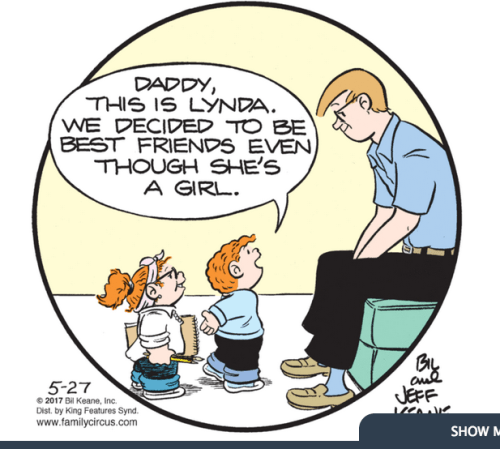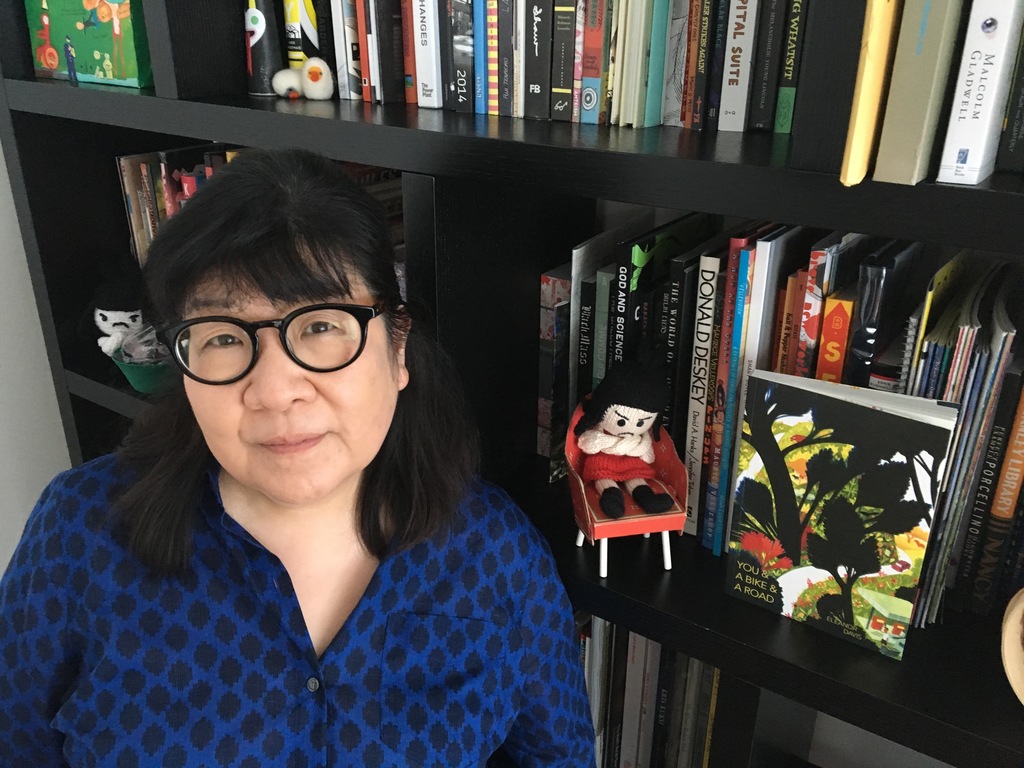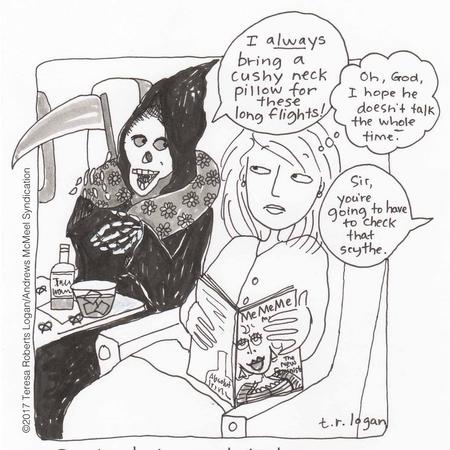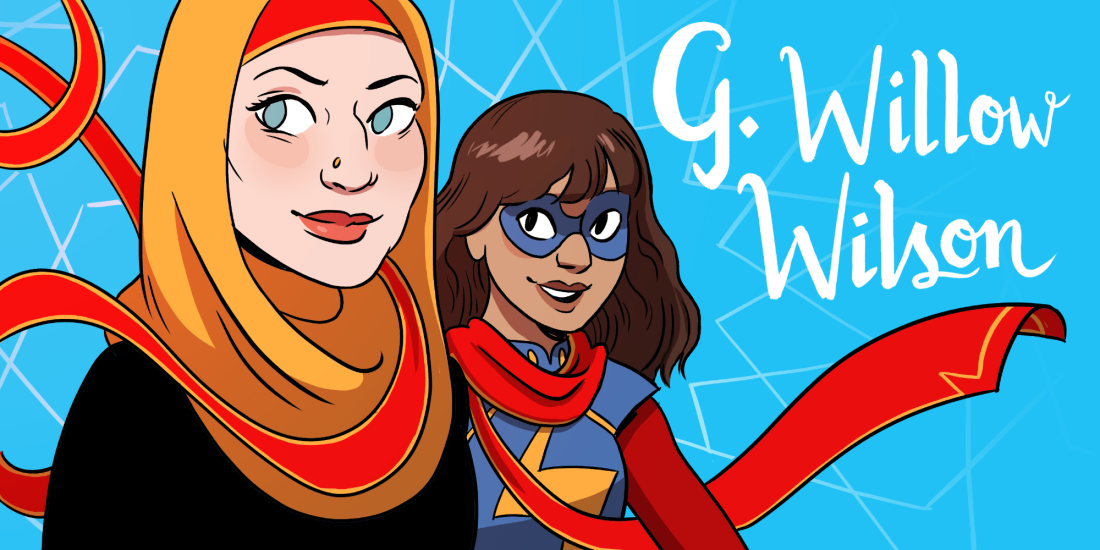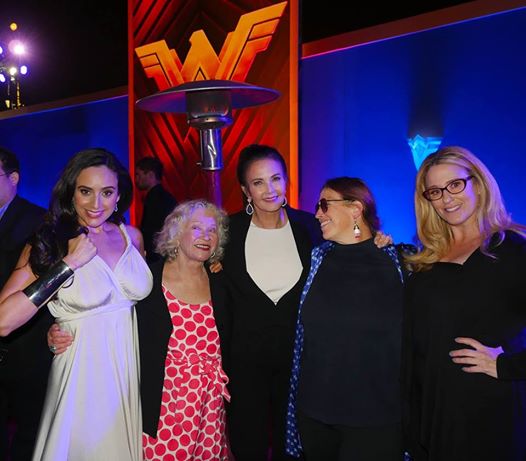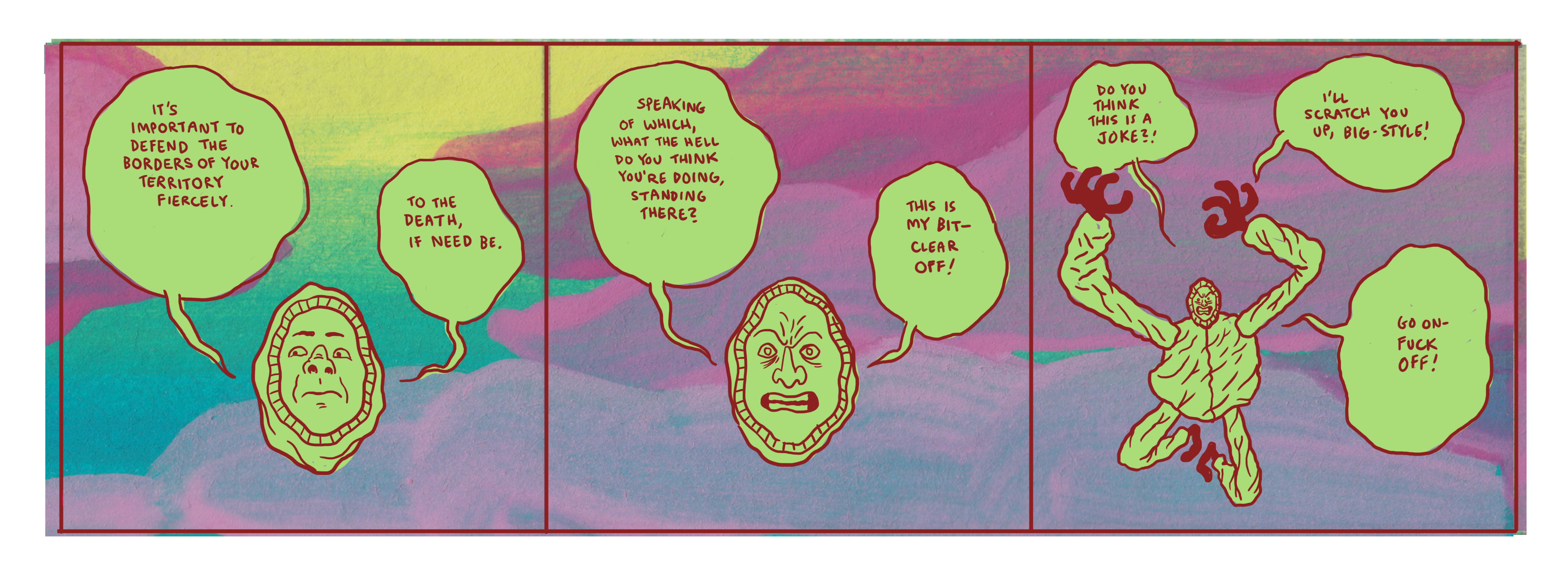Sally here with some Wonder Women for your weekend – Lynda Barry, Annie Koyama, Teresa Roberts Logan, G. Willow Wilson, Trina Robbins, and more!
—————————————————————————————————
Aww…look at the tiny fabulous Lynda Barry, making a guest appearance in Bil Keane’s Family Circus…! Over on The Comics Beat Heidi MacDonald writes joyously about how this came about:
“The other night at the Reuben Awards, cartoonist Lynda Barry was presented with the Milton Caniff award for her lifetime achievement because, after all, she is funk queen of the universe.
But at the NCS annual meeting where she got the award, she also met a hero of her own, Jeff Keane, the artist on Family Circus and son of the original creator, Bil Keane. Barry explains what happened on her tumblr in her own inimitable way, but the short version is that Family Circus was very important to her growing up as a child from a troubled family. Upon meeting Keane she burst into tears. And then she found out she had a guest spot in the comic.“
Read the story in Lynda’s own words HERE.
—————————————————————————————————
Comics publisher extraordinaire Annie Koyama is the featured “Type Reader for June” on Type. She answered a special comics-themed questionnaire, where she admitted to reading comics “unabashedly” on public transportation, and owning but never finishing Chris Ware’s Building Stories. Also:
“If you weren’t running a Canadian comics empire, what would you be doing right now?
I’d be planting a vegetable garden and frolicking with woodland creatures. Ideally somewhere with really spotty Internet.“
—————————————————————————————————
Teresa Roberts Logan – or, The Laughing Redhead and a recent arrival to Pittsburgh – has officially made a career change from stand-up comedian to cartoonist. She spoke to The Daily Press recently about the different challenges the two mediums presented her with.
“When you tell a joke as a stand-up, you get to deliver that — play with the voice, emphasize certain words, play with the timing.
When it’s for print, you have to write a little more cleanly because you don’t have the benefit of being able to perform it. Putting it on paper is the performance.
With stand-up comedy, people are judging more about you than just the joke — what you look like, how you’re dressed, your personality. On paper, they’re just judging what’s on paper — the joke itself.“
Her comic The Grim Reaper will be syndicated on gocomics.com starting June 26th. Read more of her story HERE.
—————————————————————————————————
Feminist Frequency has an interview with G. Willow Wilson, author of the Ms Marvel series. After controversial comments were made by a Marvel rep about diversity killing the bottom line of a number of stories, she weighed in with her own thoughts on diversity in comics – and the topic has continued to up.
“I think diversity has become this catch-all word that is used by a lot of different groups in different ways, not all of them positive and not all of them furthering the cause of good comics. For some people in the more conservative segment of the comic book population, diversity has become sort of a dog whistle. But I’ve also heard very valid critiques of it on the left, that diversity by itself does not change the underlying structures that lead to inequality, so just having photo op diversity doesn’t actually change things. But stories that focus on authenticity and specific experiences can be very successful because it’s not about box checking. It’s about reflecting—as closely as you can in pulp fiction—a real lived experience. Because the things that makes us different are not just cosmetic. They change how we experience the world in some pretty critical ways. The stories that have done that well have really found solid fanbases. And some that do it less well. But when those stories fail, it inevitably becomes about the diversity issue when the real cause may be diversity done poorly. Or it may just be that like 90% of books, it simply fails and we don’t tend to think as hard about the mainstream same-old stories when they fail. There’s sort of a selective reading of the reasons why books, diverse or not, fail.“
To read the rest of the interview you will have to subscribe to the monthly Feminist Frequency newsletter, FREQ – do so HERE.
—————————————————————————————————
Just a few “Wonder Women” at the movie premier after party – Valerie Perez (Wonder Woman cosplayer and actress), Trina Robbins (artist for numerous issues of Wonder Woman), Lynda Carter (the original on-screen Wonder Woman), Christie Marston (grand daughter of Wonder Woman creator William Moulton Marston), and Susan Eisenberg (the voice of Wonder Woman in the Justice League animated series).
The Comics Beat reports that DC’s new Wonder Woman movie is actually pretty good. Elsewhere, Joe Wos reports on Wonder Woman for the Trib Live, and chats briefly with Trina Robbins:
” “In my opinion, she is the perfect mythic hero,” says legendary comics “Herstorian” Trina Robbins of San Francisco. “According to Joseph Campbell’s writings in ‘The Hero With a Thousand Faces,’ the hero is always the child of a virgin and a deity. She’s the child of the virgin Queen Hippolyta and a deity who, in this case, is the goddess Aphrodite, who breathes life into the baby that Hippolyta sculpts from clay. Can there be a more feminist origin story? Little Diana has two mommies!” “
Read the rest of the article HERE.
—————————————————————————————————
Extra Toppings
- Paste Magazine interviews Gabrielle Bell – apparently the extensive “free-associations” regarding cats were mostly cut out. Read it HERE.
- Another powerful comic about abortion is up on The Nib, excerpted from the upcoming collection Comics for Choice – see Candice Russell‘s and Laura Lannes‘ story HERE.
- Also on Paste Magazine, Hilary Brown reports on a new offering from Drawn & Quarterly, Elise Gravel‘s If Found Please Return to Elise Gravel.
—————————————————————————————————
Blinkers – 6-2-2017 – by Jack Brougham
—————————————————————————————————
Suzy and Cecil – 6-2-2017 – by Sally Ingraham
—————————————————————————————————
Joanie and Jordie – 6-2-2017 – by Caleb Orecchio
